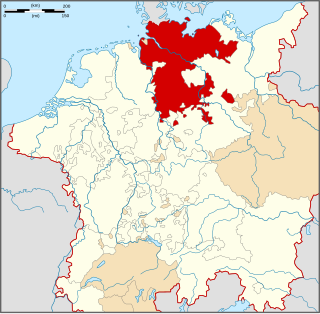
The Saxons were a group of early Germanic peoples whose name was given in the early Middle Ages to a large country near the North Sea coast of northern Germania, what is now Germany. In the late Roman Empire, the name was used to refer to Germanic coastal raiders, and also as a word something like the later "Viking". Their origins appear to be mainly somewhere in or near the above-mentioned German North Sea coast where they are found later, in Carolingian times. In Merovingian times, continental Saxons had also been associated with the activity and settlements on the coast of what later became Normandy. Their precise origins are uncertain, and they are sometimes described as fighting inland, coming into conflict with the Franks and Thuringians. There is possibly a single classical reference to a smaller homeland of an early Saxon tribe, but its interpretation is disputed. According to this proposal, the Saxons' earliest area of settlement is believed to have been Northern Albingia. This general area is close to the probable homeland of the Angles.

Saxony, officially the Free State of Saxony, is a landlocked state of Germany, bordering the states of Brandenburg, Saxony-Anhalt, Thuringia, Bavaria, as well as the countries of Poland and the Czech Republic. Its capital is Dresden, and its largest city is Leipzig. Saxony is the tenth largest of Germany's sixteen states, with an area of 18,413 square kilometres (7,109 sq mi), and the sixth most populous, with more than 4 million inhabitants.

Westphalia is a region of northwestern Germany and one of the three historic parts of the state of North Rhine-Westphalia. It has an area of 20,210 square kilometres (7,800 sq mi) and 7.9 million inhabitants.

The Obotrites or Obodrites, also spelled Abodrites, were a confederation of medieval West Slavic tribes within the territory of modern Mecklenburg and Holstein in northern Germany. For decades, they were allies of Charlemagne in his wars against the Germanic Saxons and the Slavic Veleti. The Obotrites under Prince Thrasco defeated the Saxons in the Battle of Bornhöved (798). The still heathen Saxons were dispersed by the emperor, and the part of their former land in Holstein north of Elbe was awarded to the Obotrites in 804, as a reward for their victory. This however was soon reverted through an invasion of the Danes. The Obotrite regnal style was abolished in 1167, when Pribislav was restored to power by Duke Henry the Lion, as Prince of Mecklenburg, thereby founding the German House of Mecklenburg.

Frederick Augustus I was a member of the House of Wettin who reigned as the last Elector of Saxony from 1763 to 1806 and as King of Saxony from 1806 to 1827. He was also Duke of Warsaw from 1807 to 1815.

Reuss was the name of several historical states located in present-day Thuringia, Germany. Its rulers, the House of Reuss, named all of their male children Heinrich after the end of the 12th century in honour of Henry VI, Holy Roman Emperor (1190–1197), to whom they owed the estates of Weida and Gera. The head of each branch of the family bore the German title Fürst (Prince) as did their male children.

The Kingdom of Saxony, lasting from 1806 to 1918, was an independent member of a number of historical confederacies in Napoleonic through post-Napoleonic Germany. The kingdom was formed from the Electorate of Saxony. From 1871 it was part of the German Empire. It became a free state in the era of Weimar Republic in 1918 after the end of World War I and the abdication of King Frederick Augustus III of Saxony. Its capital was the city of Dresden, and its modern successor state is the Free State of Saxony.

A stem duchy was a constituent duchy of the Kingdom of Germany at the time of the extinction of the Carolingian dynasty and through the transitional period leading to the formation of the Holy Roman Empire later in the 10th century. The Carolingians had dissolved the original tribal duchies of the Frankish Empire in the 8th century. As the Carolingian Empire declined in the late 9th century, the old tribal areas assumed new identities as subdivisions of the realm. The five stem duchies were: Bavaria, Franconia, Lotharingia (Lorraine), Saxony and Swabia (Alemannia). The Salian emperors retained the stem duchies as the major divisions of Germany, but they became increasingly obsolete during the early high-medieval period under the Hohenstaufen, and Frederick Barbarossa finally abolished them in 1180 in favour of more numerous territorial duchies.
Oldenburg may also refer to:
The Saxons were a confederation of Germanic tribes during the Early Middle Ages, and formed part of the merged group of Anglo-Saxons.

The Duchy of Saxe-Lauenburg, was a reichsfrei duchy that existed 1296–1803 and 1814–1876 in the extreme southeast region of what is now Schleswig-Holstein. Its territorial center was in the modern district of Herzogtum Lauenburg and originally its eponymous capital was Lauenburg upon Elbe, though in 1619 the capital moved to Ratzeburg.

The Lower Saxon Circle was an Imperial Circle of the Holy Roman Empire. It covered much of the territory of the medieval Duchy of Saxony, and was originally called the Saxon Circle before later being better differentiated from the Upper Saxon Circle by the more specific name.
The history of Saxony consists of what was originally a small tribe living on the North Sea between the Elbe and Eider River in the present Holstein. The name of this tribe, the Saxons, was first mentioned by the Greek author Ptolemy. The name Saxons is derived from the Seax, a knife used by the tribe as a weapon.

Because of Germany's long history before 1871 as a non-united region of distinct tribes and states, there are many widely varying names of Germany in different languages, more so than for any other European nation. For example, in the German language, the country is known as Deutschland from the Old High German diutisc, in Spanish as Alemania and in French as Allemagne from the name of the Alamanni tribe, in Italian as Germania from the Latin Germania, in Polish as Niemcy from the Protoslavic nemets, and in Finnish and Estonian as Saksa and Saksamaa respectively from the name of the Saxon tribe.
Northern Germany is the region in the northern part of Germany, whose exact area is not precisely or consistently defined. It varies depending on whether one has a linguistic, geographic, socio-cultural or historic standpoint. The five coastal states are regularly referred to as Northern Germany. Though geographically in the northern half of Germany, Westphalia, Brandenburg, and the northern parts of Saxony-Anhalt are rarely referred to as Northern Germany and instead are almost always associated with Western Germany and Eastern Germany respectively.
Schaumburg is a district in Lower Saxony, Germany. Schauenburg is a municipality in Hesse
Low Saxon or Lower Saxon may refer to:

The Electorate of Saxony was a state of the Holy Roman Empire established when Emperor Charles IV raised the Ascanian duchy of Saxe-Wittenberg to the status of an Electorate by the Golden Bull of 1356. It comprised a territory of some 40,000 square kilometers. Upon the extinction of the House of Ascania, it was feoffed to the Margraves of Meissen from the Wettin dynasty in 1423, who moved the ducal residence up the river Elbe to Dresden. After the Empire's dissolution in 1806, the Wettin Electors raised Saxony to a territorially reduced kingdom.
Saxony is a historical region in Germany and a federal state.











